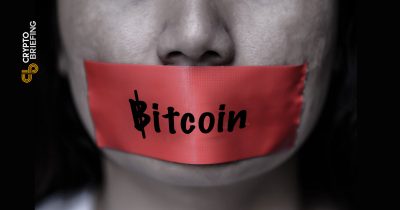New Bitcoin Mining Pool Says It Will Censor BTC Transactions
Blockseer is touting contentious censorship features with the rollout of its new Bitcoin mining pool.

Key Takeaways
- Blockseer Mining pool will mine blocks that only include filtered transactions.
- The mining pool will reject transactions from blacklisted wallets.
- Twitter commentators said that regulators will use the example of Blockseer to force other Bitcoin mining pools to perform transaction censorship.
Share this article
Blockseer, a U.S.-based subsidiary of DMG Blockchain Solutions, recently announced a private beta version of a new Bitcoin mining pool. This particular mining pool comes with a unique feature, however.
Blacklisting Bitcoin Blocks
The Blockseer Mining Pool will censor transactions from blacklisted wallets and mandate miners to undergo KYC, according to marketing materials.
New blocks generated by the Blockseer pool will only include filtered transactions. The filters will be based on the data provided by Walletscore, the company’s own blockchain forensic tool, and other sources like blacklisted Bitcoin wallet addresses.
Regulators such as the U.S. Treasury Department’s Office of Foreign Asset Control (OFAC) blacklists bitcoin wallets which they have connected to criminal activity.
OFAC has already blacklisted 20 new Bitcoin addresses owned by a North Korean hacking group in May 2020, for example.
Blockseer said the company wants to comply with OFAC and make sure its mining pool also rejects transactions from blacklisted wallets. Sheldon Bennett, COO of DMG, said in a press release:
“Blockseer’s pool brings a new compliance-focused standard to the industry, not only in the data the pool provides to its users, but also in the Bitcoin blocks it mines on the network. The pool is focused on being devoid of transaction from known nefarious wallets.”
Regulating Mining: A Slippery Slope
Various crypto commentators have been less than bullish on the news, claiming Blockseer’s news will set the wrong precedent. Riccardo Spagni, the previous lead maintainer of Monero, said, “it’s only a matter of time till most Bitcoin mining pools are forced to do this transaction filtering.”
It’s only a matter of time till most Bitcoin mining pools are forced to do this transaction filtering. Might be time to dust off p2pool + focus on Stratum v2 support for pools. Also worth noting that adding more privacy to Bitcoin would prevent this.
h/t @JEhrenhofer pic.twitter.com/sSZEdgSE3T
— Riccardo Spagni (@fluffypony) November 11, 2020
Other experts agree. According to Juraj Bednar, Co-Founder of Hacktrophy, a situation where a mining pool decides not to include dirty transactions sets a dangerous precedent.
“If the government comes in and says you can’t mine the blocks that spend these UTXOs, or you’ll lose either a bank account, exchange account, business permit or go to jail for money laundering, most of the big miners would comply. Blockseer is just a first example,” Bednar writes in his blog.
Leo Wandersleb, the founder of WalletScrutiny.com, wrote that the situation could lead to a soft fork and a new war among various mining pools.
Even though pools make Bitcoin mining more profitable for individual miners, they have been criticized for being very centralized. Because mining pools are centralized, they can be forced to comply with regulations.
Spagni said that to counter this trend, Bitcoin developers should implement new privacy features, and miners should adopt decentralized Bitcoin mining pools to keep the network free.
Share this article
